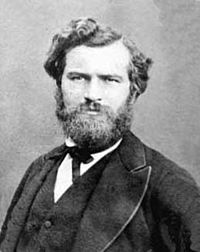Camille Jordan Scientist
Marie Ennemond Camille Jordan (5 January 1838 – 22 January 1922) was a French mathematician, known both for his foundational work in group theory and for his influential Cours d'analyse. He was born in Lyon and educated at the École polytechnique. He was an engineer by profession; later in life he taught at the École polytechnique and the Collège de France, where he had a reputation for eccentric choices of notation.He is remembered now by name in a number of foundational results: The Jordan curve theorem, a topological result required in complex analysis The Jordan normal form and the Jordan matrix in linear algebra In mathematical analysis, Jordan measure (or Jordan content) is an area measure that predates measure theory. In group theory the Jordan-Hölder theorem on composition series is a basic result. Jordan's theorem on finite linear groupsJordan's work did much to bring Galois theory into the mainstream. He also investigated the Mathieu groups, the first examples of sporadic groups. His Traité des substitutions, on permutation groups, was published in 1870; this treatise won for Jordan the 1870 prix Poncelet.The asteroid 25593 Camillejordan and Institute of Camille Jordan are named in his honour.Camille Jordan is not to be confused with the geodesist Wilhelm Jordan (Gauss-Jordan elimination) or the physicist Pascual Jordan (Jordan algebras).
